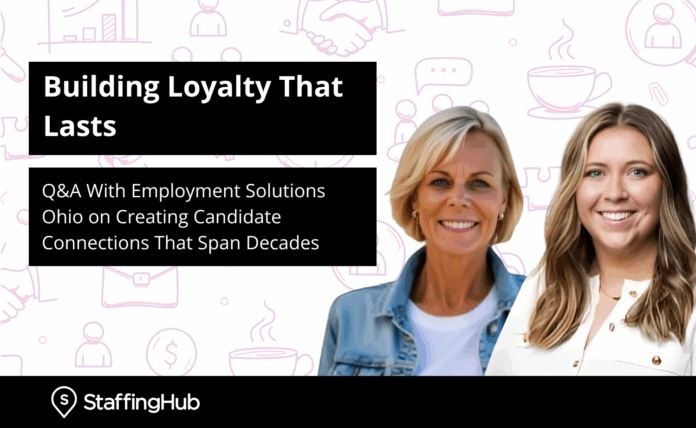
At this year’s Avionté CONNECT conference, we caught up with Christy Carter and Maty Macaulay from Employment Solutions Ohio, a firm that’s become renowned for creating exceptional candidate experiences while scaling smart.
Their approach? Using technology as a force multiplier for human connection rather than a replacement for it.
From automated birthday texts that feel personal to referral programs that have quintupled their word-of-mouth pipeline, Employment Solutions has cracked the code on operationalizing genuine care. In our conversation, Carter and Macaulay share how they’ve built systems that let their team focus on what matters most — the relationships — while ensuring no candidate falls through the cracks.
Q. What brought you to CONNECT this year — and what kinds of conversations are you most excited to be part of?
Maty Macaulay: This is my second year at Avionté CONNECT. Last year, we were just getting the feel of how the conference works and dipping our toe into learning more about Avionté. But this year, our consultant told Christy that this is a really important conference to be at.
Christy Carter: One of the reasons that we have prioritized this is the information shared. And it’s not just the speakers, but it’s the connections between other agencies. We can share our struggles and see what other agencies are doing. It’s about learning best practices, networking, and — not to sound punny — the connections that you can make.
One of the driving forces was the technology that’s rolling out moment by moment. We’re trying to figure out what people are doing that’s working for them and how we can best harness it to fit into our model.
Q. What does a standout candidate experience actually look like at Employment Solutions — and how do you know it’s working?
CC: One of the things we really pride ourselves in is that anybody who walks in the door is welcomed and treated with respect. We have a team that welcomes them right when they walk in, and as they leave they’re addressed by name and thanked for coming in. We try very hard to make sure that they know what’s next every step along the way. They have a phone number, they have an email address, and they have a name of who they can follow up with.
We know it’s working because candidates that come in and are hired permanently to one of our clients, come back to use when that job ends. We also have a referral program that has just exploded.
MM: Just recently I interviewed a candidate that had been placed at one of our clients permanently 10-plus years ago. We were having a conversation about a possible internal job that we have for him, and he was talking on and on about how loyal he feels to Employment Solutions. So I guess we’re doing something right if, after 10 years, people still want to come back to our agency. That makes you feel warm and fuzzy.
Q. Where does technology help you deliver that experience at scale — without losing the personal touch?
CC: We have a texting program that the entire staff uses. All of our communications that go out come through that one number, and it’s not just, “Here’s your new job.” It’s the day before, they get a scheduled text that says, “Hey, don’t forget your new job is this.” Then on the day of, it’s, “Good luck on your first day.” Two hours after they get off work, it’s, “Hey, how was your first day?” And they’re all automated.
It makes them feel like somebody’s checking in. They get a scheduled birthday text every year, and they get a “happy 30 days on your job” text. It’s constant communication. We have a really good marketing department that has helped us build up journeys that do that extra follow up.
And it’s not just all work-related either. Forty-five days into their job it might say, “Hey, we wanted to check in. How are things for you?” Or, “Did you know that this celebration is going on in the park this weekend?” Or, “The food trucks are out this weekend. Will you be going?” Just little things. “It’s National Dog Day. What kind of dog do you have?” And we have them sending in pictures of their dogs. We really try to make them feel connected, so that they’re faithful to us.
MM: And using automation, like you said, helps a lot with that. The last couple years, we’ve been trying to make our database as clean and concise as possible. OT [Odell Tuttle] was saying in his talk this morning that AI will highlight your problem areas. So we’re cleaning up our database and making sure that it’s as organized as possible, so we can do more things like that and use the human element to our full advantage.
CC: We have a couple of bots that are going out to help do some data cleanup. We have moved slowly into AI because we want to make sure that we do it the smart way. I don’t want to roll out a technology, then try to find a use for it. I’d rather have a use and try to figure out the right technology, so that it’s smooth and seamless. You don’t want your candidates feeling like they’re talking to a bot.
The other thing that we’ve got is this referral software that has worked fabulously for us. It’s quintupled the number of referrals that we get. We have people that will call us and say, “I referred these eight people.” And you can see it — it’s right there in the app, it has rolled down, and it’s worked great for us. That’s helped get our name out there. And they also feel connected to the agency also because they’re referring people, we’re putting them to work, and they’re getting paid.
Q. You’re known for having a strong referral culture. What’s been key to building that — and making sure it stays active over time?
CC: We have some QR codes that are posted. Some of our clients have posters that say, “Did you know we pay referrals?” We put it out there that we pay $125, and when they hit the number of hours required, we pay it. We have a gift card that we send out electronically so it’s in their inbox. It’s branded, it says Employment Solutions on it.
We make a promise, and we make sure that we follow through.
MM: We pay people even if they’re not in our database. If they say that they’ve referred candidates to us, even if they’ve never worked with us, we still pay them. That helps extend our reach into the community even more.
Q. How do you make referrals feel easy and worthwhile for candidates — and how do you track whether those efforts are paying off?
MM: We pay a little bit more than industry average for our referral bonus. If a candidate has worked 80 hours, we pay them $125. And that’s unlimited — if someone refers 100 people to us, we will pay them 100 times over.
CC: I think 15 is the record right now. Someone last year referred 15 people.
We let everyone know we pay referral bonuses — we put it out on social media, we let people know when they come in the door, and we include it in a survey after people have been in our office. And when they’re paid, oftentimes when I find out about it, I’ll say, “Make sure you tell all your friends.”
And like I said, we don’t say we’re going to pay and then mess around. We get a call, “Hey, I referred so-and-so, and they hit their hours this week.” Then Maty immediately pays them.
MM: And we track how much we’re sending each person. It’s pretty obvious to see that the more we spend in referral bonuses, the more hours that are billed. It’s definitely worth it.
Q. What’s one system, habit, or mindset that’s made the biggest difference in sustaining this kind of people-first culture?
CC: We treat our internal staff like they’re family. We try very hard to make people feel important, that they’re part of the operation.
We also have a strong culture. We have core values, and we don’t just talk about them — we live those values, and they flow downhill.
If you have a candidate that’s doing really well for you and you’re communicating with them, we want them to feel that extra love. There are a million staffing agencies out there. You can only control a little bit of what you do, a little bit of what influences them. So you want to make sure that you’re treating them well.
Not every candidate is going to be your best candidate, but we want everybody to feel like they’ve got the same opportunity coming in the door and walking out the door as everybody else. They’re to be treated with respect, they’re to be treated with integrity, they’re to be communicated with. All those things we value with our internal team, they take and give to the candidates as they’re coming in. We don’t want people going to a different agency and forgetting us. We want to create something memorable.
Someone who’s been working for us on and off for 12 years sent me a text the other day. He’s now a supervisor for one of our clients. And he said, “Hey, I just got two new people. I just want you to know I’m going to take care of them.” That’s the special sauce — you control what you can, you do the very best that you can, and the rest takes care of itself.
Q. How do you help your recruiters or internal teams stay aligned with the candidate experience you want to deliver?
MM: Like Christy mentioned, we live and die by our core values. And we try to make it fun. Christy will send out an email saying, “The first person who can list all of our core values gets a coffee.”
CC: We have a monthly high-five award. “Which one of your teammates exemplifies this core value?” And we’ll pick one. Or I’ll say, “Who exemplifies your favorite core value of the week?” It sounds so cheesy, but it’s so reinforcing and it works.
We also post little contests internally to keep people’s morale up. Recently, we had everyone make a poster of their favorite core value, then we put that out on socials.
And we’re making sure that our core values are passed down. We’re making sure we respond to text messages in a timely manner. We’re making sure that people understand the jobs. We have a standard of communication we’re required to follow.
In my prior job, we were talking about family members that worked in the business, and someone said, “Most places don’t encourage family members to work for you.” And my husband and I own the agency, so obviously that’s not our value. But they said, “How do you keep family harmony in the agency?” And one of the women — she’s well into her 90s now — scooted up to the mic and she said, “Well, the boys know they would break my heart if they had a disagreement.”
We try really hard to let the team know, “We’re here for you. We’re here to listen.” We make sure the candidates feel heard. People are not always going to get along. You’re going to have some disagreements, especially among the internal staff and from the candidates. We want to make sure that people have an avenue where they feel heard.
We don’t mess around with paychecks. Paychecks are paid. If we mess up, we make sure they’re paid the same day. We’ve got some things in place where we can pay them immediately. It hasn’t always been like that. There have been times that my husband and I have been out on a holiday delivering a check out of our checkbook to make sure somebody is paid.
But, again, that’s where the rubber meets the road. You say what you’re going to do, and you follow up and you do it.
Q. What’s next for your team — is it evolving the candidate journey, deepening referrals, or something entirely new?
MM: I’d say all of the above.
CC: We’re exploring some new technology that we’re hoping rolls out smoothly.
People are asking if AI is going to take their job, and I loved what OT said: “It’s not going to take your job. It’s going to give you more width, more breadth so you can do a better job.” We’re taking some of the menial tasks — the initial calls, the scheduling, the data enrichment — and passing that off to a bot, so that we can focus on and improve the things that really matter.
MM: We can focus on the human aspect, while technology handles the more basic tasks that aren’t as relationship-focused.
Connect with Christy Carter, Maty Macaulay, and Employment Solutions Ohio to learn more about how they build memorable candidate experiences and a strong referral culture.







